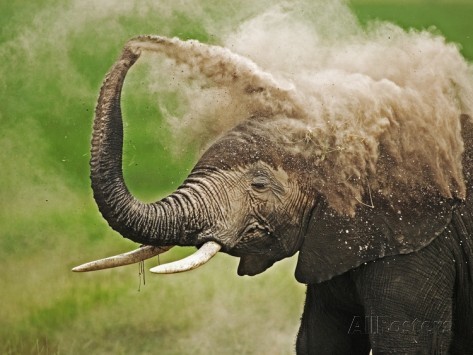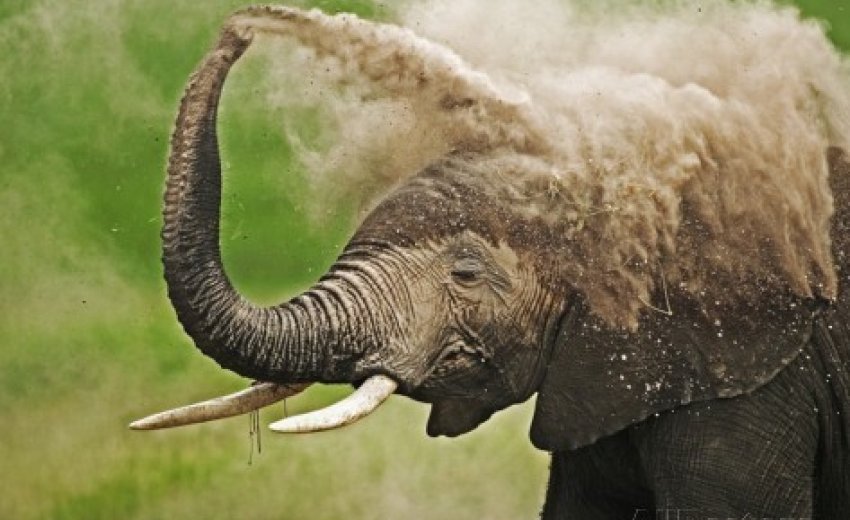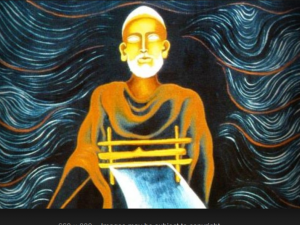
Elephant's Bath
Have you ever noticed the references made to dog's tail, elephant's bath and flight of a chicken in Gurbani?
Well, some of these phrases and expressions were already in use before Gurbani was written, while others seem to have been minted by the authors of Gurbani themselves. These catchy phrases are easy to remember. You can repeat and use them in your daily conversations.
For instance, suaan poochh (dog's tail):
suaan poochh jiu bhaio na soodhau bahut jatan mai keenau.
I have tried a lot, but like a dog's tail this evil mind remains bent, it does not straighten. - GGS, 633
An Arab proverb proclaims: "A dog's tail will never be straight" while an Indian proverb says, "A dog's tail stays crooked even if it is buried for twelve years".
Sometimes, the bad habits of human beings are compared to a dog's tail. People exclaim that a person's character and personality is like a dog's curved tail, which can never be straightened, meaning that they will never change their behaviour.
Similarly, the world is like a mirage, but this mind is so attached to its illusory permanence that even after being told about the illusory nature of the world, the humans remain overly attached to all impermanent endeavours and thus never leave their old bad habits. Like a dog's tail, they remain in their same habits, unless they shed their egoism and seek wisdom from Gurbani.
Kunchar isnaan (elephant's bath) is another such example in Gurbani:
teerath barat ar daan kar man mai dharai gumaan.
naanak nihphal jaat tih jiu kunchar isnaan.
Nanak! Having bathed at places of pilgrimage, observed fasts and made donations,
if one takes pride in one's mind then all these practices are fruitless, like an elephant's bath. - GGS, 1428
Sadly, humans, while attempting to comprehend the Divine, end up becoming slaves to the illusions of religion. Running after their self-satisfying goals, they concentrate on the means rather than the end goal, which is to walk on the virtuous path. They get entangled in useless rituals rather than reaching out and understanding the Divine.
Ritualistic practices become their saviours, becoming a mirage of spirituality. Worse than that, the ignorant take excessive pride in the rituals they perform; thus instead of transforming one's behaviour and shedding one's egotism and other vices, the individual indulges in further unhealthy egoistic pleasures of the mind. When egotism balloons, the discerning mind shuts down, and the mirage becomes their false reality.
This verse equates such behaviour to an elephant which takes a bath but then rolls in the dust rendering the bath futile. In the same way, cleansing of the body is useless if the mind is polluted even more with the pride of mere ritualistic practices.
Kukaṛ dee udaaree (flight of a chicken) is another such phrase:
hansaa setee chit ulaasahi kukaṛ dee odaaree.
Some people aspire in their mind to fly with swans but are capable only of the flight of a chicken. - GGS, 322
Swans, one of the largest flying birds, are said to reside in the summer on high mountain lakes and migrate to lakes in the lower regions for the winter. In literature and folklore, swans are symbols of love, grace and purity because of their white plumage, artistry, and beauty. It is believed that a swan, when offered a mixture of milk and water, is able to drink the milk alone as opposed to a crane that cannot do so. Hence, they symbolise the persons who possess prudence and discrimination between the good and the bad or the eternal and the transient.
If someone wants to imitate them, it won't happen until one really learns consciously the qualities and skills they possess. One has to put one's heart and mind into learning and performing virtuous actions and deeds like them.
Only then can one take the flight to higher spiritual ideals. Or else one is left to flap one's wings endlessly like a rooster that can only flap but cannot fly high away to greener pastures or a better way of thinking and behaving.
In summary, when self-reflection takes place, we can then improve and straighten out our wrong actions and thoughts. We will then know the difference between the goal and the actions needed to attain the goal, and not foolishly mix-up the two.
Since we will not waste precious resources in learning and unlearning bad habits, we will become clearer in the observation of our actions. We will then break off from vices and bad company and start building a new virtuous and spiritually elevated life.
By the guidance of Gurbani, our limiting bonds will break and we will be able to take flight as white beautiful swans, succeeding in living a life of peace and serenity.
Life is a gift of nature; but beautiful living is the gift of wisdom. - Greek adage
The article has been extracted from one of AWAT issues.
Those who wish to receive the gems of Gurbani from AWAT can subscribe here: http://awordathought.com/
Compiled and edited by
Dr Jaswant Singh
Editor, awordathought.com
---------------------------------------------------------------------------
Related articles
Part I: Raja Ambrik
Part II: Bhagat Angra ji and Bhagat Bidar
Part III: Sri Dhru Bhagat & Sri Prahladh Bhagat ji
Part IV: The Story of Ajaamal
Part V: The Story of Bhagat Sudama
Part VI: The story of Gotam Muni & Ahalia
Part VII: The Story of Raja Janak
Part VIII: The Story of Raja Bali
Part IX: The Story of Ajraja-Akrur
Part X:The Story of Bhisham Pitaama
Part XI: The Story of Chandar Hans
Part XII: The stories of Durbaasha Rishi and Gajinder (the Elephant)
Part XIII:The Stories of Kubija Maalan and Oudhar
Part XIV:The Story of Sarvan Bhagat
Part XV: The Story of Rishi Balmeek
Part XVI: The Stories of Sankaadik and Rukmaangudh
Part XVII: The Story of Sukdev Muni





